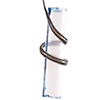Researchers from North Carolina State University have demonstrated miniature soft hydraulic actuators that can be used to control the deformation and motion of soft robots that are less than a millimeter thick. The researchers have also demonstrated that this technique works with shape memory materials, allowing users to repeatedly lock the soft robots into a desired shape and return to the original shape as needed.
“Soft robotics holds promise for many applications, but it is challenging to design the actuators that drive the motion of soft robots on a small scale,” says Jie Yin, corresponding author of a paper on the work (Advanced Materials, “Fully 3D-Printed Miniature Soft Hydraulic Actuators with Shape Memory Effect for Morphing and Manipulation”) and an associate professor of mechanical and aerospace engineering at NC State. “Our approach makes use of commercially available multi-material 3D printing technologies and shape memory polymers to create soft actuators on a microscale that allow us to control very small soft robots, which allows for exceptional control and delicacy.”
The new technique relies on creating soft robots that consist of two layers. The first layer is a flexible polymer that is created using 3D printing technologies and incorporates a pattern of microfluidic channels – essentially very small tubes running through the material. The second layer is a flexible shape memory polymer. Altogether, the soft robot is only 0.8 millimeters thick.
 Researchers from North Carolina State University have demonstrated miniature soft hydraulic actuators that can be used to control the deformation and motion of soft robots that are less than a millimeter thick. The researchers have also demonstrated that this technique works with shape memory materials, allowing users to repeatedly lock the soft robots into a desired shape and return to the original shape as needed.
Researchers from North Carolina State University have demonstrated miniature soft hydraulic actuators that can be used to control the deformation and motion of soft robots that are less than a millimeter thick. The researchers have also demonstrated that this technique works with shape memory materials, allowing users to repeatedly lock the soft robots into a desired shape and return to the original shape as needed.








Leave a reply